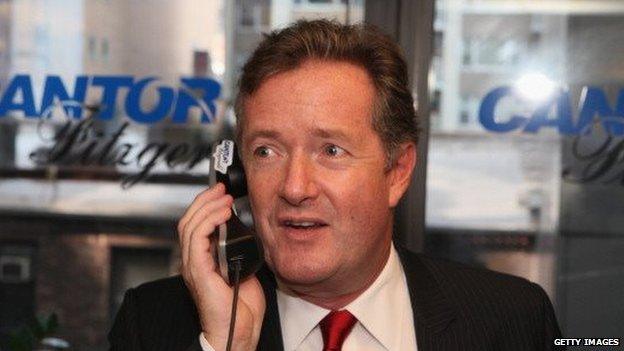Piers Morgan's axing prompts transatlantic schadenfreude
- Published
- comments

Piers Morgan run as a CNN primetime host is coming to an end
Piers Morgan's sparsely watched CNN talk show is getting axed after three years.
Something akin to joy following the announcement - which came in a New York Times article, external by media critic David Carr - is resounding on both sides of the Atlantic. As word spread, more than a few tweets, external expressed disappointment that the axe which had fallen on Morgan was figurative and not literal.
But why?
According to Carr, Morgan never connected with his US audience.
"It's been an unhappy collision between a British television personality who refuses to assimilate - the only football he cares about is round and his lectures on guns were rife with contempt - and a CNN audience that is intrinsically provincial," he writes. "After all, the people who tune into a cable news network are, by their nature, deeply interested in America."
In particular, Morgan's strong stance in support of gun control following the shootings at an Aurora, Colorado, theatre and at a school in Newtown touched a third rail in American politics. When he stirred the wrath of the pro-gun portion of the US population, he didn't have a core audience to rally to his side.
"Mr Morgan's approach to gun regulation was more akin to King George III, peering down his nose at the unruly colonies and wondering how to bring the savages to heel," Carr writes.
The Daily Caller's Jim Treacher notes, external that last Tuesday's telecast of Morgan's show garnered only 270,000 total viewers, less than a 10th of the number who follow Morgan on Twitter.
"That's probably because Twitter doesn't carry the sound of his voice," he jabs.
"Who wants to watch a pompous Brit pontificate to Americans about guns?" he writes. "Um, that's kinda why we broke off from you A-holes in the first place, old chap. We didn't want you telling us what to do then, and we don't want you telling us what to do now."
National Review's Jim Geraghty writes, external that Morgan's lack of success wasn't due to "Americans being naturally inclined to dislike, distrust, or be disinclined to watch those who hail from the British Isles".
After all, he argues, British culture - from James Bond to Downton Abbey, the Beatles to One Direction - are huge hits in the US.
"The issue was that he kept communicating to an American audience why he thought their country was so bad," he concludes.
Morgan's fall should be seen as more than just Americans rejecting a gun-hating Brit, argues Paul Joseph Watson on InfoWars.com.
"Americans will not tolerate the establishment media undermining constitutional freedoms in concert with White House talking points," he writes, external. "He is the victim of the general malaise that mainstream media finds itself mired in thanks to Americans' growing distrust of television news."
Morgan was also confronted with the difficult situation of having to replace long-time host Larry King, as King himself notes.
"In truth, when someone is on the air for the amount of years I was on, whether it's me or anyone, whoever replaces him, you don't want to be the person who replaces him," he told, external the Daily Beast's Lloyd Grove. "It's very hard to step in - putting myself aside - into any shoes that have been there forever."
The 81-year-old King, who was pushed out by CNN after his own show's ratings steadily slipped, adds that if the network wanted him back, "I would do it". (I hear Jay Leno is looking for work, as well.)
Meanwhile, in the UK, there's a "din of schadenfreude in UK media" over Morgan's sacking, tweets, external BBC business editor Robert Peston.
According to the Guardian, Americans didn't appreciate Morgan's "special lack of charm".
"It's true that he remained a resolutely unassimilated British presence," the paper wrote, external. "His Twitter feed is largely given over to comments about football and cricket, and spats with personalities most Americans will never have heard of."
The Telegraph's Dan Hodges writes, external that judging from the reaction to Morgan's announcement, "you'd think he'd spent his time running a white slavery ring" and not successfully anchoring "a prime-time current affairs show on CNN, one of the most respected networks in US television history".
There are two opinions on Morgan in the UK: "Some people despise him. And the rest really despise him."
Part of that, he argues, is British media's envy of his success. Another is the phone-tapping scandal that has Morgan under government investigation. And by seeking fame and fortune in the US, "Piers Morgan just isn't one of us any more".
More than that, however, he says that the outpouring of glee at Morgan's failure represents a pack mentality that has developed in the UK.
"People are tweeting their delight at Piers Morgan's demise because they feel they have to," he writes. "It's something you feel you must do if you want to be part of polite society. Like saying 'good morning' or expressing delight at the emergence of the spring sunshine."
Time magazine media critic James Poniewozik likens, external the rush to explain CNN's decision to an old-fashioned British murder mystery.
"There are too many fingerprints here to point to any one culprit, but ultimately it was CNN's new chief, Jeff Zucker, who ended things," he writes. "Morgan was Zucker's problem and another executive's hire, and British or American, pro- or anti-gun, that's always an unsurvivable combination."
When your ratings are in the tank, and you have an active and engaged segment of the population that actively despises you, it's only a matter of time before the axe is sharpened and ready to swing.
- Published24 February 2014
- Published14 February 2014
- Published19 January 2011